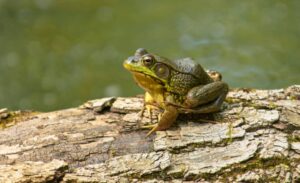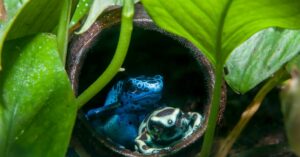If you’ve ever wondered, “Why do frogs not like mint?” you’re not alone! It’s an interesting question that taps into the fascinating world of frogs’ sensory experiences. Frogs, like many other creatures, are highly sensitive to certain smells and chemicals in their environment.
While mint is refreshing for humans, frogs might have a completely different reaction to it. This aversion to mint can be traced to the plant’s natural compounds, which could irritate or overwhelm their delicate systems. In this article, we’ll explore why mint is something frogs tend to avoid and the science behind it.
Understanding how mint affects frogs and why it is often used as a deterrent

Mint, particularly its essential oils, is often used as a deterrent for frogs because of its strong smell and the compounds it contains, like menthol. Frogs have sensitive skin, and the strong aroma and oils from mint can irritate their skin and respiratory systems, making areas with a strong mint presence uncomfortable for them.
Key Reasons Mint Affects Frogs:
- Strong Smell: Frogs have heightened senses, including an acute sense of smell. Mint’s pungent aroma is overwhelming and repels them.
- Irritation to Skin and Eyes: The oils from mint can cause irritation or discomfort when they come in contact with frogs’ sensitive skin and mucous membranes.
- Respiratory Distress: Mint’s essential oils can affect frogs’ respiratory systems, making it harder for them to breathe properly.
This is why mint is often used as a natural, non-toxic way to keep frogs away from gardens or areas where they aren’t wanted. However, it’s important to note that while mint is a deterrent, large amounts of mint oil or direct contact with the essential oil can be harmful to frogs. If you need to deter frogs, using mint plants instead of concentrated oils is a safer option for the environment and amphibians.
Frog Sensitivities to Smells
Frogs have a highly developed sense of smell, which they rely on to navigate their environment, find food, and avoid predators. Their sensitivity to smells is closely tied to their survival, but it also makes them vulnerable to strong or irritating odors. Some smells are known to deter or harm frogs because of how they interact with their delicate sensory systems and skin.
Key Smell Sensitivities of Frogs:
- Chemical Sensitivity: Frogs are highly sensitive to chemicals in the air and water. Strong, artificial smells from chemicals such as pesticides, chlorine, and cleaning agents can cause distress or harm frogs. Their permeable skin allows these chemicals to penetrate easily, making them especially vulnerable to toxic substances.
- Essential Oils: Certain essential oils, such as mint, eucalyptus, tea tree, and citronella, are effective at repelling frogs. These oils contain volatile compounds that are too strong for frogs and may cause irritation to their skin and respiratory system. Frogs are often deterred by gardens or areas where these oils are used.
- Ammonia: The smell of ammonia, which is often present in fertilizers or animal urine, can be repellent to frogs. Ammonia affects their respiratory systems and irritates their sensitive skin, encouraging them to avoid areas where it is present.
- Smoke and Fumes: Smoke from fires or other strong fumes, such as gasoline, is intolerable for frogs. Since they absorb oxygen through their skin, inhaling smoke or toxic fumes can severely affect their breathing and overall health.
- Vinegar: Vinegar, with its acidic smell, is another natural deterrent for frogs. It doesn’t cause lasting harm in small amounts but can make an area unpleasant for them due to the strong, sharp odor.
- Rotten or Fermenting Odors: Frogs are naturally attracted to decaying organic matter where insects are plentiful. However, extremely rotten or strong fermenting odors may deter them, as these smells indicate an inhospitable environment.
Why Do Frogs Not Like Mint?
Frogs tend to avoid mint due to its strong smell and the chemical compounds found in mint plants and essential oils, particularly menthol. These factors make mint an effective natural deterrent. Here’s why frogs don’t like mint:
1. Strong Aroma:
Frogs have a highly sensitive sense of smell, and mint has a potent, sharp aroma that overwhelms their olfactory senses. The intensity of mint’s smell can cause discomfort, making frogs avoid areas where mint is present.
2. Menthol Irritation:
Menthol, a key component of mint, can irritate a frog’s sensitive skin and mucous membranes. Frogs have permeable skin, which means they can absorb substances from their environment easily. When they come into contact with mint or its oils, it may cause irritation, making them uncomfortable and prompting them to leave.
3. Respiratory Discomfort:
The essential oils in mint, especially menthol, can affect a frog’s respiratory system. Frogs breathe partially through their skin, so the volatile compounds in mint oils can interfere with their ability to breathe properly, leading to avoidance.
4. Natural Repellent:
Mint plants release chemicals to repel pests and animals that might harm them, and frogs are not immune to this effect. The oils from the plant create a protective barrier that many amphibians and insects find unpleasant.
5. Disturbance of Natural Cues:
Frogs use their sense of smell to find food and sense their environment. The overpowering scent of mint can disrupt these cues, making it harder for them to locate prey or detect predators, further motivating them to avoid mint-heavy areas.
In addition, the combination of mint’s strong smell, the irritating nature of menthol, and its potential effects on frogs’ skin and respiratory systems makes mint an unwelcoming plant for frogs, which is why they tend to stay away from it.
Mint as a Natural Frog Repellent
Mint is commonly used as a natural frog repellent due to its strong scent and the presence of menthol, which frogs find unpleasant. Using mint as a deterrent is both eco-friendly and non-toxic, making it an ideal choice for people who want to keep frogs away from specific areas without harming them or the environment.
Why Mint Works as a Frog Repellent:
- Strong Scent: The potent smell of mint, especially from peppermint and spearmint varieties, is overwhelming to frogs. Their sensitive olfactory systems make them highly reactive to strong odors, which cause discomfort and deter them from staying in the area.
- Menthol’s Irritation: Mint contains menthol, which can irritate frogs’ delicate skin and mucous membranes. Frogs have permeable skin that easily absorbs substances from their environment, and the menthol compounds found in mint can cause mild irritation, prompting frogs to avoid contact.
- Disruption of Sensory Cues: Frogs rely on their sense of smell to navigate, detect prey, and avoid predators. Mint’s intense aroma interferes with these natural sensory processes, making areas treated with mint less attractive for frogs to linger in.
How to Use Mint as a Natural Frog Repellent:
- Plant Mint in Key Areas: Growing mint plants around your garden, patio, or entryways can create a natural barrier that frogs will be less likely to cross. Mint grows easily and spreads quickly, so it’s an effective long-term solution for keeping frogs at bay.
- Mint Essential Oil Spray: Mixing mint essential oil with water and spraying it around areas where frogs are a concern can create an immediate deterrent. To make this solution, mix 10–15 drops of peppermint or spearmint oil with water in a spray bottle and apply it to surfaces, including walls, windowsills, and garden borders.
- Mint Leaves and Mulch: You can also scatter crushed mint leaves around areas where frogs tend to gather. As the leaves dry out, they continue to release the strong aroma, acting as a natural repellent.
- Mint-Infused Water: Boiling mint leaves in water and then spraying the cooled mixture around your home or garden is another method. The scent will linger in the air and deter frogs from the area.
Why Mint Affects Frogs and Not Other Animals

Mint affects frogs differently than other animals primarily due to the unique characteristics of frogs’ biology, especially their sensitive skin and heightened olfactory systems. Here’s why mint impacts frogs more strongly than other animals:
1. Sensitive Skin:
Frogs have highly permeable skin that absorbs substances directly from their environment, including chemicals, oils, and gases. Mint, particularly the menthol found in it, can irritate frogs’ skin, as the oils are easily absorbed, leading to discomfort. This absorption process is much more significant for frogs compared to mammals, reptiles, or birds, whose skin acts as a stronger barrier against external irritants.
2. Highly Sensitive Respiratory System:
Frogs breathe through both their lungs and their skin (cutaneous respiration), meaning their respiratory system is very sensitive to airborne compounds. The volatile oils released by mint plants, especially essential oils like menthol, can cause irritation to their respiratory systems, making it difficult for frogs to breathe properly. Other animals, with more specialized respiratory systems like lungs or gills, are less affected by these airborne compounds.
3. Olfactory Sensitivity:
Frogs rely heavily on their sense of smell to navigate their environment. Their heightened sensitivity to smells makes them more reactive to strong odors, like those from mint. While mammals or birds might notice the scent of mint, it doesn’t overwhelm them in the same way because their olfactory systems are not as easily disturbed by strong, natural scents.
4. Differences in Metabolism:
Frogs have different metabolic processes compared to other animals. The compounds in mint, such as menthol and other volatile oils, can cause stress to their metabolic systems when absorbed, leading to discomfort or avoidance behavior. Larger animals, like dogs, cats, or even insects, can metabolize or tolerate the effects of these compounds better, which is why mint doesn’t affect them as strongly.
5. Behavioral Sensitivity:
Frogs are highly responsive to environmental changes, including the presence of new or unusual smells. Mint’s strong aroma disrupts their natural sensory environment, which can confuse or disorient them. Other animals, especially mammals, tend to have more adaptable sensory systems, meaning they can tolerate a wider range of smells without it impacting their behavior as dramatically.
Why Other Animals Aren’t as Affected:
- Mammals (e.g., cats, dogs): Mammals have a different skin structure that doesn’t absorb substances in the same way as frogs. Their respiratory systems are also more robust, and their olfactory senses, while sharp, aren’t overwhelmed by mint to the same degree.
- Birds: Birds have a different olfactory structure, and while they can detect smells, they rely less on it for navigation. They aren’t as sensitive to plant-based odors like mint and tend to avoid irritants more through sight than smell.
- Insects: While some insects may be repelled by mint, others aren’t affected as significantly because their cuticles protect them from direct exposure to plant oils. However, mint is known to repel certain insect species due to its strong smell.
Conclusion
Why do frogs not like mint? Frogs are highly sensitive to strong smells and compounds like menthol, which is found in mint. Their permeable skin and delicate respiratory systems make them vulnerable to irritation from mint’s potent aroma and oils.
As a result, the overwhelming scent of mint disrupts their natural behaviors, making them avoid areas where mint is present. In short, why do frogs not like mint? It’s because mint’s strong smell and chemical components are uncomfortable and irritating for them.

